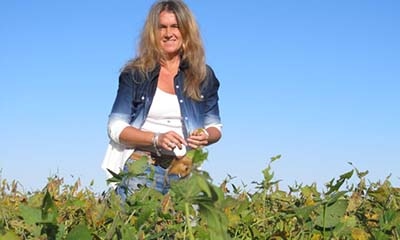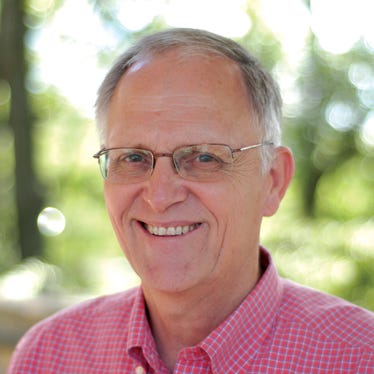October 11, 2016

Maria Giraudo loves what she does, and receiving an award for what she loves is, in her words, “like touching the sky with your hands.” Maria is a fifth generation farmer from Argentina who is enthusiastically carrying on a family legacy that involves spreading the word about no-till farming.
Maria Beatriz “Pilu” Giraudo will receive the 2016 Kleckner Award presented by the Global Farmer Network on October 11 in Des Moines, Iowa. The award presentation and Global Farmer Roundtable, hosted by the Global Farmer Network, is held each October and is an invitation-only side event at the World Food Prize Symposium “Borlaug Dialogue” in Des Moines.

AG ADVOCATE: Maria Beatriz Giraudo Gaviglio of Argentina is a fifth generation family farmer, an agronomy consultant, a no-till crop producer and a livestock producer. She is spreading the word about the benefits of no-till farming.
What is the Global Farmer Roundtable? And Kleckner Award?
The Global Farmer Roundtable gathers farmers from around the world to discuss current issues in farming and food production. The founder of the World Food Prize and father of the Green Revolution, Dr. Norman Borlaug, challenged the world’s farmers to collaborate—to learn from each other by sharing their collective experiences, wisdom and knowledge. He reminded everyone that the “successful revolutions of the past can be templates for our actions and a resource to maintain our morale.”
The Kleckner Award is given annually since 2007 and recognizes a global farmer who exemplifies strong leadership, vision and resolve in advancing the rights of all farmers to choose the technology and tools that will improve the quality, quantity and availability of agricultural products around the world. The award was established to honor Dean Kleckner, an Iowa farmer who served as chairman emeritus of the Global Farmer Network.
A dedicated no-till farmer, she has a large following on social media
Maria is the tenth winner of the Kleckner Award. She is the daughter of one of the pioneers of no-till technology in Argentina. Her family adopted no-till into their production systems more than 30 years ago. She recently wrapped up a two-year term as president of the Argentina No-Till Farmers Association, Aapresid.
While she learned plenty from her father, Maria has put her own fingerprints on the job of educating about technology. When her government began attacking the practice of no-till farming, she and about 2,000 other no-till farmers took to social media to tell society about the practice. Maria has a twitter following of more than 5,000 and is actively tweeting about progress in agriculture under the handle @PiluGiraudo.
Advice for farmers who want to tell their story on social media
“When you go to tell your story on social media, there are some important things to consider,” says Maria “Pilu” Giraudo:
-Start with a mission and a vision. Think about what you hope to accomplish.
-There are many voices out there. It’s important to listen to everyone, be open and talk with people.
-Share real information about what’s happening on your own farm.
-Be available to the media when they want to talk.”
One of the things farmers had neglected doing for too long is helping consumers understand how taking care of the soil, and sustainable production, are benefits for all people – not just farmers, but also consumers.
Maria “Pilu” Giraudo: “Today, 92% of the land that’s farmed in Argentina is under no-till, but 30 years ago, one had to have an open mind to start farming this way. Tillage was a tradition. We shared information farmer-to-farmer, because farmers trust each other. We talked about our problems and mistakes, so we didn’t have to repeat them.”
Glyphosate for no-till soybeans in Argentina was heavily criticized
The practice of no-till was started by a farmer, and then supported by scientists in order to save the soil from wind and water erosion. It really caught on in Argentina when Round-Up Ready Soybeans were introduced. The use of glyphosate with this practice is what brought criticism and the need to advocate.
Maria “Pilu” Giraudo: “Sustainable production is a solution for humanity. We as farmers haven’t done a good enough job communicating with consumers in the past. We have to assume the mistake and talk about what we do. We should talk about the challenges we face and how we solve them, in order to build trust with consumers. No-till farming is a technology that takes care of the environment for all of us. It’s been this way all along. We just haven’t told people.”
On Maria’s family farm, they grow soybeans, wheat, barley, corn and sorghum and also raise livestock. In addition to the farm, Maria is an agronomic consultant. She has also recently accepted a position as Coordinator of Public Policies for Sustainable Development within Argentina’s Ministry of Agribusiness.
Award recognizes strong leadership, vision of a global farmer
Maria Beatriz “Pilu” Giraudo will receive the 2016 Kleckner Award presented by the Global Farmer Network on Tuesday, October 11 in Des Moines, Iowa at a reception hosted by the Global Farmer Network Foundation and CropLife International. The award is given annually since 2007 and recognizes a global farmer who exemplifies strong leadership, vision and resolve in advancing the rights of all farmers to choose the technology and tools that will improve the quality, quantity and availability of agricultural products around the world.
The award was established to honor Dean Kleckner, Chairman Emeritus of the organization. Previous award recipients are Rosalie Ellasus, Philippines (2007); Jeff Bidstrup, Australia (2008); Jim McCarthy, Ireland (2009), Gabriela Cruz, Portugal (2010); Gilbert arap Bor, Kenya (2011) Rajesh Kumar, India (2012) V. Ravichandran, India (2013), Ian Pigott, United Kingdom (2014), and Lydia Sasu, Ghana (2015).
About the Author(s)
You May Also Like






